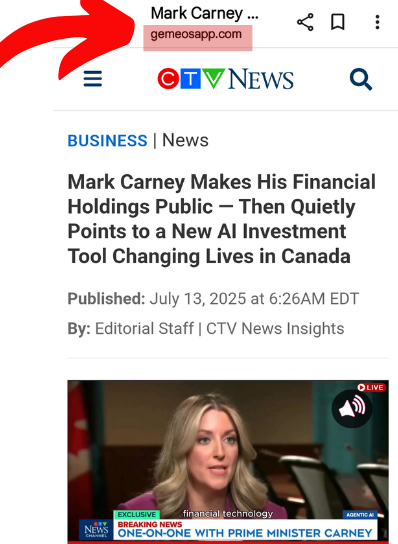 Fraudulent cryptocurrency schemes are no longer limited to obscure websites or isolated email campaigns. Criminals are exploiting the reach of major advertising networks, particularly Taboola and Outbrain, to place deceptive content directly on some of the world’s most trusted news websites, even Facebook and Google are allowing scam ad content. These networks, by prioritizing revenue over rigorous oversight, have become inadvertent enablers of a new wave of global online fraud.
Fraudulent cryptocurrency schemes are no longer limited to obscure websites or isolated email campaigns. Criminals are exploiting the reach of major advertising networks, particularly Taboola and Outbrain, to place deceptive content directly on some of the world’s most trusted news websites, even Facebook and Google are allowing scam ad content. These networks, by prioritizing revenue over rigorous oversight, have become inadvertent enablers of a new wave of global online fraud.
Criminals craft articles that impersonate respected media outlets and misuse the images and names of high-profile public figures. The combination of visual credibility, authority borrowing, and massive distribution creates a nearly invisible pipeline for funneling unsuspecting readers into fraudulent cryptocurrency schemes.
📸 Misusing Public Figures to Signal Legitimacy
Scammers rely on public figures to lend false credibility to their schemes. Articles have emerged falsely claiming that leaders such as Prime Minister Mark Carney endorse “AI-driven investment platforms.” Carney has never endorsed such products.
Internationally, scams exploit the reputations of figures like Elon Musk, Bill Gates, and institutions such as Tesla, RBC, and HSBC. By attaching fraudulent claims to trusted names, scammers manipulate public trust and leverage the psychological tendency to defer to authority.
📡 Advertising Networks as Active Enablers
Taboola and Outbrain specialize in distributing “sponsored content” across high-traffic news sites. Their networks place paid content alongside legitimate reporting, yet their limited verification processes allow scam operators to infiltrate these trusted spaces.
 For example, an Outbrain advertisement appeared directly on the official CTV News website, linking to an article that impersonated CTV reporting and falsely attributed endorsements to Mark Carney. Readers encountering the placement were likely to assume the story had undergone editorial review. In reality, it was a paid placement purchased by scammers.
For example, an Outbrain advertisement appeared directly on the official CTV News website, linking to an article that impersonated CTV reporting and falsely attributed endorsements to Mark Carney. Readers encountering the placement were likely to assume the story had undergone editorial review. In reality, it was a paid placement purchased by scammers.
By distributing sponsored stories across outlets including CTV, CBC, BBC, CNN, and The Guardian, these networks blur the line between verified journalism and fraudulent promotion, effectively granting scammers access to millions of readers under the guise of legitimacy.
🤥 The Mechanics of Deception
These campaigns funnel readers into fraudulent cryptocurrency schemes through a predictable set of tactics:
🪙 Unrealistic Returns – Claims of becoming a millionaire in months.
🎭 Fabricated Endorsements – Misusing public figures and institutional brands.
⚡ High-Pressure Sales Tactics – Pressuring immediate action to avoid “missing out.”
🌐 Offshore Redirects – Moving victims to platforms outside domestic regulatory oversight.
Once personal information or funds are provided, recovery is rarely possible. Victims are pressured to invest further, often encountering blocked or ignored withdrawal requests.
🌍 A Global Pattern
Fraudulent campaigns impersonating the BBC in the United Kingdom have falsely cited finance expert Martin Lewis. In Australia, fake stories on the Sydney Morning Herald have promoted cryptocurrency platforms allegedly linked to banks or government agencies.
The consistent characteristics across jurisdictions include:
📰 Impersonation of trusted media outlets
👤 Misuse of well-known public figures
📢 Placement via advertising networks with minimal oversight
💸 A funnel into high-risk or fraudulent cryptocurrency schemes
Through these tactics, scammers exploit both trust and the expansive reach of ad networks to create highly effective pipelines for global fraud.
🔒 How to Protect Yourself
🔗 Verify URLs – Impostor domains such as booksstorenow•com are designed to look legitimate.
✅ Cross-Check Claims – Major news will appear across multiple reputable outlets.
🚩 Recognize Red Flags – Sudden shifts from news reporting to investment promotion, unrealistic wealth promises, and misuse of public figures indicate fraud.
🖥️ Exercise Caution with Sponsored Content – Even on trusted websites, Taboola and Outbrain may distribute unvetted material.
📣 Report and Warn Others – Sharing alerts and flagging fraudulent ads reduces exposure for potential victims.
As these scams evolve, staying vigilant remains the first line of defense. The power to disrupt this pipeline lies in collective awareness and action, turning the tables on those who exploit trust for profit.
- Log in to post comments
